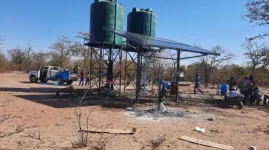Gokwe Nembudziya will soon see 100 village business units spring up before Independence Day celebrations begin. The government created these units to boost food security at the village level. They follow President Mnangagwa's promise that everyone and every place matters in development plans. Dr. Tungwarara stated they have sent drilling equipment to Gokwe for borehole creation.
Every village in Gokwe should receive a solar-powered borehole under this plan. Schools will also benefit, allowing them to start projects that bring in money. Each business unit comes fully equipped to operate on its own. Standard features include a solar-powered borehole from the Presidential Drilling Scheme, two large water tanks holding 10,000 liters each, and four community water taps for public use.
The units also contain a fenced one-hectare garden with drip irrigation for growing vegetables. The exact size may change based on how much water the borehole produces. Two fish ponds measuring 100 cubic meters or 100 square meters round out the basic setup. Depending on local needs, some locations might receive extra equipment like feeding and water troughs for animals.
The government aims to build 35,000 such units across the country. An average village needs about 33 metric tonnes of grain yearly. A well-run business unit can make around seven tonnes of grain in one growing cycle, which covers nearly 20 percent of what a village needs. Running two production cycles can supply about a third of the required grain for the entire village.
Every village in Gokwe should receive a solar-powered borehole under this plan. Schools will also benefit, allowing them to start projects that bring in money. Each business unit comes fully equipped to operate on its own. Standard features include a solar-powered borehole from the Presidential Drilling Scheme, two large water tanks holding 10,000 liters each, and four community water taps for public use.
The units also contain a fenced one-hectare garden with drip irrigation for growing vegetables. The exact size may change based on how much water the borehole produces. Two fish ponds measuring 100 cubic meters or 100 square meters round out the basic setup. Depending on local needs, some locations might receive extra equipment like feeding and water troughs for animals.
The government aims to build 35,000 such units across the country. An average village needs about 33 metric tonnes of grain yearly. A well-run business unit can make around seven tonnes of grain in one growing cycle, which covers nearly 20 percent of what a village needs. Running two production cycles can supply about a third of the required grain for the entire village.












